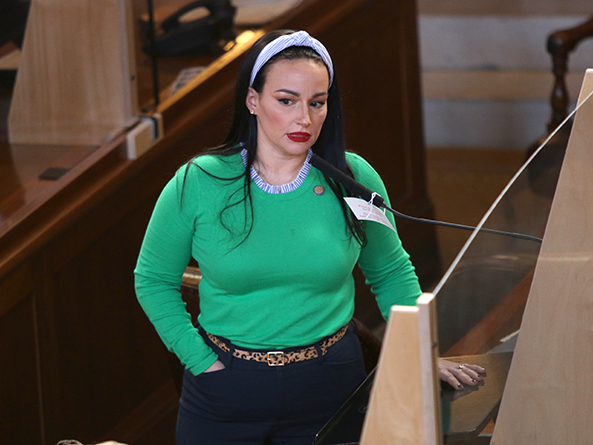Seizure action plans for students advanced
A bill that would require Nebraska schools to create individualized health plans for students with seizure disorders advanced from the first round of debate March 29.
Under LB639, introduced by Omaha Sen. Jen Day, a school with an enrolled student who has a seizure disorder and requires medication would have at least one employee at each school building who is trained to recognize and respond to seizures and administer the medications.
Day said LB639 would ensure that schools are prepared to help students diagnosed with seizure disorders and students who have first-time seizures while at school.
“Literal seconds can mean the difference in these children’s quality of life and in preventing potentially life-altering brain damage,” she said.
Day said a 2014 survey found that only 17 percent of Nebraska teachers have received training on epilepsy or other seizure disorders and nearly 40 percent wanted to receive such training.
Before a school employee could administer seizure medication, a student’s parent or guardian would provide a written authorization, a written statement from the student’s doctor and the medication in its unopened, sealed package with the intact label affixed by the dispensing pharmacy.
A parent or guardian also would have to collaborate with school employees to create a written, individualized health plan to acknowledge and prepare for the health care needs of a student diagnosed with a seizure disorder. Each student’s seizure action plan would be distributed to any school personnel or volunteers responsible for them.
A student would be allowed to possess the supplies, equipment and medication necessary to treat a seizure disorder if specified in the student’s seizure action plan.
The bill also would require each certificated school employee to participate in at least one hour of self-study review of seizure disorder materials.
Under LB639, a school or school employee would not be liable for damages related to the care of a student’s seizure disorder unless they resulted from an act of “willful or wanton misconduct.”
Finally, the bill would require the State Board of Education to develop requirements for school employee training programs, procedures for developing seizure action plans and the content of those plans.
An Education Committee amendment, adopted 34-2, clarifies that the bill’s provisions would apply to each approved or accredited public, private, denominational and parochial school in Nebraska.
Under the amendment, each certificated school employee would review seizure disorder materials at least once in every two school years beginning in school year 2022-23.
Sen. Lou Ann Linehan of Elkhorn supported LB639, saying she has heard no opposition to the bill from the education community. She said teachers want to be prepared to recognize the signs and symptoms of seizures, which often can be mistaken for inattentiveness.
“Teachers will want to know that,” Linehan said. “It’s an early sign that maybe teachers will notice that parents won’t.”
Bayard Sen. Steve Erdman opposed the bill, saying the Legislature should not impose requirements on private, denominational and parochial schools because they do not receive significant public funding.
Sen. Julie Slama of Peru also opposed LB639, saying it would create an unfunded mandate for schools and could lead to lawsuits if they fail to help a student who has a seizure. She said the state does not require similar training or plans for any other major medical issue that students could face while at school.
“Schools already have these plans in place,” Slama said, “and I still just don’t see the widespread data to show a failure in our Nebraska schools handling these seizures properly.”
Omaha Sen. John Cavanaugh, who supported the bill, said the Legislature created a similar requirement that took effect in 2012. He said the Nebraska Concussion Awareness Act requires public, private, denominational and parochial schools to make training available to coaches to help them recognize the symptoms of a concussion or brain injury.
“This is not unusual,” Cavanaugh said. “When it rises to the level of importance [of] dealing with the health and safety of children, we have given this kind of guidance in the past.”
Senators voted 33-2 to advance the bill to select file.


